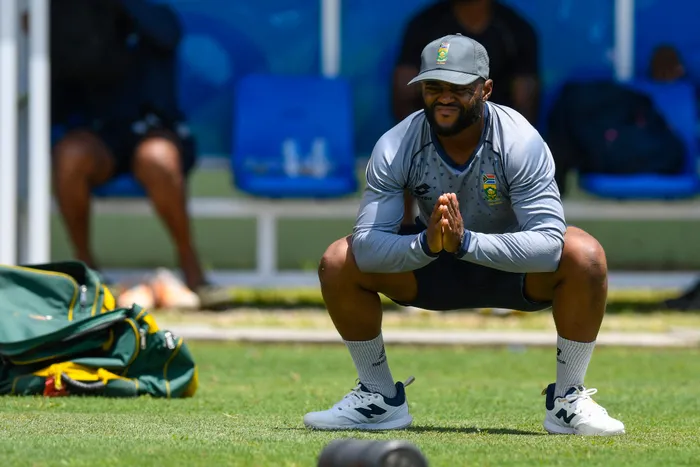Proteas reshuffle for Eden Gardens Test after Rabada injury — but selection signals balance, not panic

Kagiso Rabada’s rib injury forced South Africa into a last-minute reshuffle for the Eden Gardens Test. Corbin Bosch replaces him, adding batting depth while Jansen and spin remain central to the Proteas’ plan. Meanwhile skipper Temba Bavuma (pictured) has taken it all in his stride.
Image: AFP / File
South Africa’s first Test in India arrived with a late setback: Kagiso Rabada has been ruled out of the opening match at Eden Gardens after sustaining a rib injury in training. Captain Temba Bavuma and coach Shukri Conrad responded by reshaping the XI, bringing in Corbin Bosch and adjusting the batting order to favour depth.
Rabada’s absence is a blow on paper — he is the only Proteas bowler inside the top-10 of the Test bowling rankings — yet the selection shows South Africa leaning into conditions where batting runs and spin will matter.
Selection and balance
IOL Sport’s Ongama Gcwabe reports that at the toss Bavuma won and elected to bat. The Proteas will play seven batters, with Wiaan Mulder returning to the starting XI at No.3 after missing the second Test in Pakistan. Tony de Zorzi, rewarded for his recent form in Pakistan, slots in at No.5. Tristan Stubbs and Kyle Verreynne complete the top seven, while Bavuma takes his usual No.4 spot. Aiden Markram and Ryan Rickelton open.
On the bowling front Marco Jansen and Corbin Bosch are the likely new-ball pairing, supported by all-rounder Mulder and the spin duo of Keshav Maharaj and Simon Harmer. Senuran Muthusamy has missed out on the first Test despite recent accolades.
Bosch replaces Rabada, with the fast-bowling all-rounder and is the team’s choice to cover both seam and batting depth. With Eden Gardens expected to offer little grass and to favour spinners as the match wears on, the Proteas’ move to include an extra batting resource alongside pace makes tactical sense within the facts provided.
Is Rabada’s absence necessarily crippling?
However, according to IOL Sport’s Michael Sherman, Rabada’s overall standing is strong, but the statistical record cited from his previous tours of India shows he has taken nine wickets in six Tests there, returning an average of 44 and a strike rate of 92. Those figures suggest Indian conditions have not historically played to his greatest strengths.
That context appears to have informed selection thinking: the team has added batting depth without entirely sacrificing pace. The gamble is that Jansen and Bosch can fill new-ball duties and that spin — Maharaj and Harmer — will control second-innings play.
Bavuma’s words at the toss
Bavuma outlined the approach at the toss, saying: “We will have a bat. The boys just came back from Pakistan. I was with the A team. From a preparation point of view, we've done as best as we can. It's not every day you get to play against 50,000-60,000 people in the stands. So, I'm looking forward to the challenge.
"Being back in India, it's always an eye-opener. Looking forward to everything. It's been sitting well at the moment (on being the World Test Champions). Hopefully, nothing really changes. For the performance point of view, work around with a lot more pride.
"But to keep doing what we've been doing. (On the pitch) It's on the dry side. Not much grass. It's a typical Indian wicket. First innings runs is the key. Rabada misses out due to a rib injury, Corbin Bosch comes in his place."
What to watch
Key markers for the Proteas will be how the Markram–Rickelton opening partnership fares, whether De Zorzi can continue his recent run of form at No.5, and how effectively Jansen and Bosch strike early against an Indian attack used to home conditions.
The evidence provided suggests the selection is a tactical calibration rather than capitulation: South Africa have balanced batting depth and seam options to suit a dry pitch where spin is likely to be decisive. Whether that trade-off pays off will begin to be answered as the match progresses at Eden Gardens.